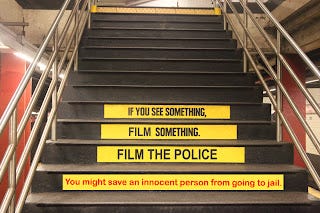Georgia police officer arrested a man who video recorded him during a traffic stop.

A Georgia police officer was able to maintain his professionalism for only a few minutes before he arrested a citizen who was video recording him during a traffic stop last week.
Andrew Ogiba, 19, was charged with obstructing or hindering law enforcement officers, because he chose to narrate into his video camera after signing the citation instead of tearing out of the parking lot within seconds of receiving it.
It is obvious from his video that Mcrae police officer B. Wyatt was trying to teach Ogiba a lesson.
As a result, Ogiba spent two hours in jail before paying a $500 bond to be released. He had to pay an additional $150 because his 1995 Camaro had been impounded.
But now Ogiba is already planning to file a lawsuit.
“I’ve already emailed the ACLU and will be talking to a lawyer tomorrow,” he said in a telephone interview with Photography is Not a Crime Sunday evening.
Ogiba, who has been in the U.S. Army for two years, is worried the arrest will affect his ROTC scholarship.
The incident took place Wednesday when Ogiba was driving back home to Mcrae from Augusta after spotting two officers parked at the side of the road.
Having received a citation for loud music earlier this year, he instinctively turned the music down, which he had been listening to during the three-hour drive.
But it was too late. The cops pulled him over and he immediately complied, pulling into the empty parking lot of a church.
As Wyatt was writing the citation from his patrol vehicle, Ogiba was narrating into the camera about how the ACLU believes noise citations are unconstitutional and how he plans to fight the citation.
http://www.photographyisnotacrime.com/2012/11/25/georgia-cop-arrests-man-video-recording-him-during-traffic-stop/
Cornell sophomore student settles lawsuit allowing people to film police.
NEWARK, NJ - The American Civil Liberties Union of New Jersey (ACLU-NJ), Seton Hall Law School’s Center for Social Justice (CSJ) and the City of Newark have reached a successful settlement in the case of Khaliah Fitchette, a Newark teenager who was illegally detained by police for using her cellphone to record an incident on a public bus in March 2010.
In addition to the settlement, Police Director Samuel A. DeMaio has issued a training memorandum that affirms the rights of citizens to record police officers performing their duties and makes clear that officers cannot confiscate, delete, or demand to view a citizen’s photos or video without a warrant.
The memorandum was issued in November 2011, as Fitchette’s lawsuit was pending.
The department will train officers on the new policy.
“We are pleased that the Newark Police Department has adopted a policy that clearly articulates and respects the constitutional rights of citizens to record police activity,” said Seton Hall Law Professor Barbara Moses, who, along with a number of Seton Hall Law students, represented Fitchette as a cooperating attorney for the ACLU-NJ. “We hope this policy prevents incidents like the one involving Khaliah Fitchette from ever happening again.”
Alexander Shalom, Policy Counsel for the ACLU-NJ, said other departments should follow Newark’s lead.
“With video technology so prevalent now, police officers have to clearly understand exactly what rights citizens have when they film in public,” said Shalom. “Newark’s policy makes clear distinctions about citizens’ rights, and every law enforcement department in New Jersey should adopt these kinds of guidelines.”
Fitchette, who was a high school honors student when she was arrested by police, said she hopes her case educates the public about their rights when it comes to recording police.
“I’m glad this is resolved and I can put this behind me,” said Fitchette, who is now a sophomore at Cornell University. “It’s important for everyone to know their rights, especially since most people now have cellphones with video capabilities.”
http://www.aclu-nj.org/news/2012/11/19/arrest-teen-cellphone-video


